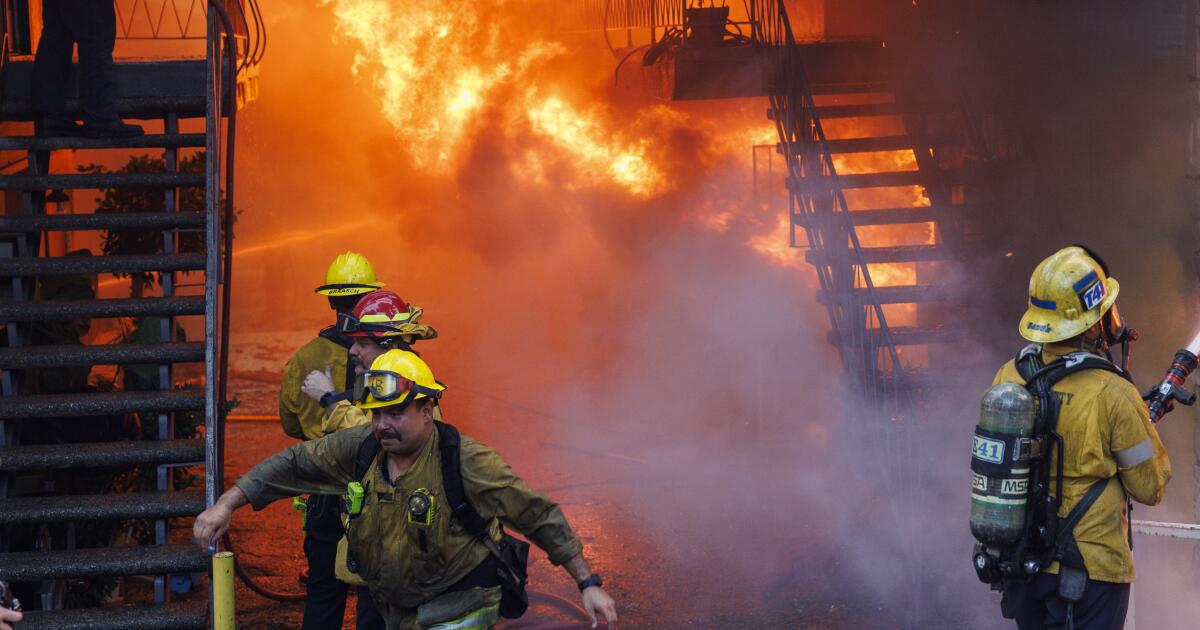How Hollywood workers are grappling with the Southern California fires


As the market for documentaries and other content slowed and work dried up in Hollywood, producer Kourtney Gleason was already worried about making the mortgage payments on the home she bought last year with her boyfriend.
Now, as raging fires have halted film and TV production in Southern California and many in the industry have lost homes, she’s terrified that the entertainment business will be set back yet again. Though she’s been in the industry for 12 years, Gleason is now reluctantly looking at restaurant jobs to get by.
“The industry in the town is so fragile that every little thing becomes a bigger bump in the road,” she said. “Another bump that will push things back from getting ramped up.”
The destruction of the fires only compounds the difficult lot for many of Hollywood’s workers. Still reeling from the pandemic, they faced financial hardship during the dual Hollywood labor strikes in 2023, then were hit with a sustained slowdown in film and TV production that has driven many to rethink their careers in the industry.
“A lot of the below-the-line workers were already under an incredible amount of pressure,” said Kevin Klowden, executive director of the Milken finance institute. “For Hollywood workers, it becomes one more blow.”
The sheer scope of the region’s multiple fires means that nearly every echelon of Hollywood has been hard hit.
The Palisades fire, which has burned more than 17,200 acres and destroyed numerous homes, businesses and longtime landmarks in the Pacific Palisades area, is home to many Hollywood stars, studio executives and producers. Actors such as Billy Crystal and Cary Elwes lost homes in the blaze.
Across the region, the Eaton fire has now burned at least 10,600 acres in the Pasadena and Altadena areas and destroyed many structures. The San Gabriel Valley is home to many of the industry’s more modest or middle-class workers, who were already financially harmed by the production slowdown and relocation of shoots to other states or countries.
The fires could rank as one of the costliest natural disasters in U.S. history. A preliminary estimate calculated by AccuWeather, the weather forecasting service, put the damage and total economic loss at $52 billion to $57 billion, which could rise if the fires continue to spread. J.P. Morgan on Thursday raised its expectations of economic losses to close to $50 billion.
Many affected homes were not insured, as some of the biggest insurers have stopped writing or renewing policies in high-risk coastal and wildfire areas. The complications with fire insurance, combined with the region’s problems with housing affordability and supply, will only be exacerbated by these fires, Klowden said, leading some to reconsider whether they can stay in California.
“It adds up,” he said. “How many more people decide they can’t afford to stay?”
Hollywood workers had been holding onto hope that 2025 would be a better year for work, perhaps closer to the levels they saw before the pandemic.
But with yet another disaster, “it feels like it’s just another weight that’s been placed,” said Jacques Gravett, a film editor who has primarily worked in television on such shows as “Power Book IV: Force” on Starz and “13 Reasons Why” on Netflix.
Gravett was out of work for 13 months between the pandemic and the strikes, and said he’s concerned about how already struggling workers will be able to absorb the financial blow from the fires.
“At least when you’re working and something happens, you have resources to get you by, and a lot of people don’t have the resources now,” said Gravett, who is co-chair of the Motion Picture Editors Guild’s African-American steering committee. “Now we’re faced with another tragedy for those who’ve been displaced. What do you do?”
The effect of the fires on industry workers could give lawmakers a push to approve Gov. Gavin Newsom’s proposed increase to the state’s film and TV tax credit program, which aims to lure production back to California and increase jobs in the Golden State, Klowden said.
“Right now, the industry desperately is waiting on the incentives to be expanded,” he said.
In the near term, discussions about new projects are already hitting a wall. Gary Lennon, showrunner of various “Power” spinoffs, including “Force,” said an agent told him there will likely be a temporary pause before anyone wants to talk about new ideas.
“Buyers and meetings for pitches being sold will take a hit for a moment,” Lennon said. “People are focused on what is immediately happening in front of them.”
Even before the fires, he said he was already getting two to three calls a week from production designers, editors, costume designers and others looking for work.
But once the industry is ready to ramp back, he said he thinks it will move quickly.
“So much has happened recently, I think production will start right away again because people do need to work,” Lennon said. “And that’s a good thing.”





